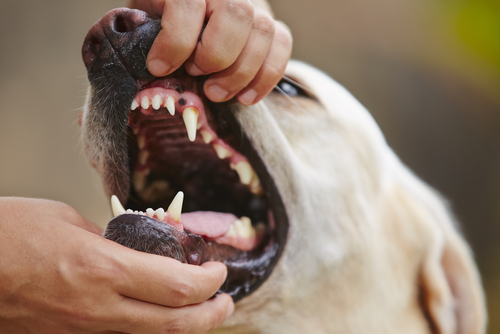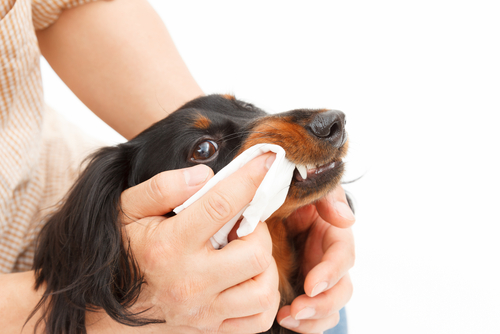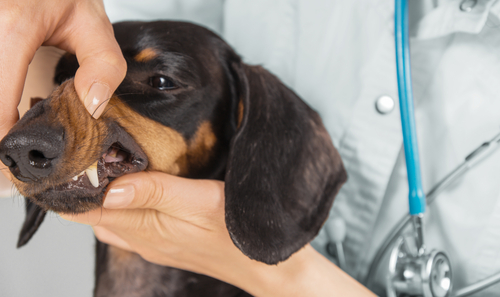We tend to overlook our canine companions’ oral hygiene, don’t we? However, we know it is important. Brushing dogs’ teeth regularly can reduce their risk of oral diseases as well as ailments related to their respiratory, pulmonary, digestive, and even urinary systems.
If you’ve got a young pup and are looking for some help in getting started, or even an older dog that is completely against getting his teeth cleaned, the following helpful tips can make the process a bit easier on everyone involved.
1. Be Patient
Most dogs are never trained to allow for examining their mouths regularly, let alone have a toothbrush stuffed in there. Teaching your dog how to handle this activity takes time and patience, but can easily be done in your home, accompanied by your pup’s favorite treats! You may need to start by rewarding your dog just for him allowing you to lift his lips.
There’s really no harm in going slowly. It’s the best way to go about it. Take your time in working up to actually brushing your dog’s mouth. After getting him used to touching his lips, gums and teeth, all the while reinforcing good behavior, you can move forward and try brushing just a few teeth. Slowly you’ll be able to advance to brushing all his teeth and gums. Being patient is key to turning the procedure into a routine that your dog won’t outright fear.
Related: Dog Brush Vacuums
2. Use Your Fingers
While your fingers may not be as effective as a toothbrush, it’s better than not brushing at all and may be the only way your dog will allow you to touch her mouth. Your finger can certainly scrub some of the daily buildup, or plaque, off of your dog’s teeth.
So even if you can’t work up to standard equipment, putting a little toothpaste on your fingers and gently rubbing your pup’s teeth and gums every day or so may keep your dog’s teeth in good health for a lot longer than not brushing at all.
3. Check With Your Veterinarian
Some people don’t realize they should be brushing their dog’s teeth until later in their pup’s life when problems arise. It’s never too late to start brushing. However, if your dog is more than a couple years old and has never had a professional dental cleaning, he may have so much tartar that brushing alone won’t prevent periodontal disease.
Check with your veterinarian to assess your pup’s dental health and discuss whether regular brushing is enough for the time being or a cleaning is in order. Your vet can also demonstrate how to brush your dog’s teeth if you’re unsure.
4. Set a Schedule
Setting a time of day for brushing your dog’s teeth is good for getting your pup in a routine. Even more so, if you’ve made the activity a part of your schedule then those daily tooth brushing sessions are much more likely to happen!
Do whatever you have to do to turn it into a habit – set a reminder on your phone or alarm on your clock, put a sticky note on the fridge (maybe even IN the fridge). It can be easy to forget if you aren’t in the habit. Getting in a routine is a great way to prevent a lapse in your pup’s dental care.
5. Try Dental Chews
A great way to help keep your pup’s teeth in good shape is by giving him chew treats made specifically for dental health. While these shouldn’t replace regular brushing, they can certainly help break down plaque and minimize bacteria in the mouth that are harmful to teeth. Dogs also tend to really enjoy this method of cleaning their teeth! Always provide supervision.
The iHeartDogs triple enzyme, grain & gluten free dental sticks in large and mini. As with all our products, each purchase helps provide healthy meals for dogs in shelters, waiting for their forever homes.
These statements have not been evaluated by the Food and Drug Administration. This product is not intended to diagnose, treat, cure, or prevent any disease. The information on this website is not intended to replace a one-on-one relationship with a qualified healthcare professional.






 Toledo, United States.
Toledo, United States.